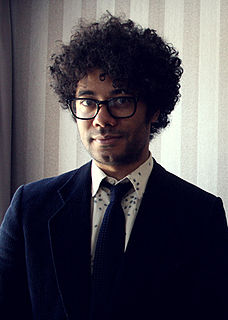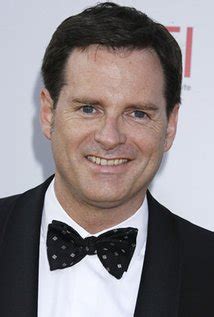A Quote by Richard Ayoade
I suppose I sort of like effects that have some organic elements rather than ones that are entirely generated by a computer. Just because, no matter how complex the algorithm is, it's still an algorithm.
Related Quotes
Every computer divides itself into its hardware and its software, the machine host to its algorithm, the human being to his mind. It is hardly surprising that men and women have done what computers now do long before computers could do anything at all. The dissociation between mind and matter in men and machines is very striking; it suggests that almost any stable and reliable organization of material objects can execute an algorithm and so come to command some form of intelligence.
Klout and various measurements of influence are fun. I love to see where I score on them, but there's a computer algorithm behind the calculation. If there's an algorithm, it can be gamed. Even if it's not gameable, you have to take a leap of faith that the number of followers, retweets, mentions, whatever really mean something.
The Facebook algorithm designers chose to let us see what our friends are talking about. They chose to show us, in some sense, more of the same. And that is the design decision that they could have decided differently. They could have said, "We're going to show you stuff that you've probably never seen before." I think they probably optimized their algorithm to make the most amount of money, and that probably meant showing people stuff that they already sort of agreed with, or were more likely to agree with.
Google has - at least at this point - maintained the line where it keeps organic results separate from the advertisements. But over time - so in other words, you still get the - there still are honest to goodness results which are based on an algorithm which is based on how important or how many people link to that particular site, so there's that. At the very beginning, there were unobtrusive advertisements on the side that sort of showed up when you typed in certain phrases. Over time, the amount of real estate that those ads take up has increased.
If there was some sort of mathematical equation for beauty, I don’t know if I would be the algorithm. I’m not a supermodel. That’s not what I do. What I do is music. I want my fans to feel the way I do, to know what they have to offer is just as important, more important, than what’s happening on the outside.
If there was some sort of mathematical equation for beauty, I don't know if I would be the algorithm. I've always been OK with that. I'm not a supermodel. That's not what I do. What I do is music. I want my fans to feel the way I do, to know what they have to offer is just as important, more important, than what's happening on the outside.
I think often people fall into the breadth trap of wanting to do too long a period of time, and obviously there's this sort of algorithm of how much depth you can put into something times how much of their life you're trying to show. My attitude has always been, I'd rather show a briefer period of time in more detail than a longer period of time in less detail.































